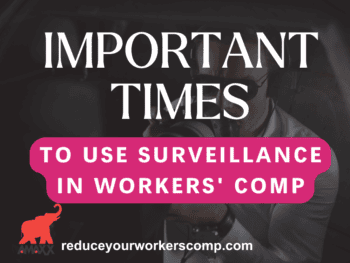The fastest growing area of workers compensation fraud is narcotics abuse. The fake workers comp claim for the purpose of feeding a drug addiction, or for the purpose of obtaining narcotics for resale, is a fast growing problem. Employers and claim adjusters should proceed with caution when an employee has been given a narcotic prescription, especially when there has not been a recent surgery.
The term “pill mills” has been used by law enforcement to describe medical facilities where the primary purpose of the medical facility is to write prescriptions for painkillers. The U.S. Drug Enforcement Administration (DEA) has been raiding medical facilities in Florida, Georgia, Ohio and other states with mixed results. They close down one pill mill only to have another one pop up. (WCxKit)
Pill mills often try to camouflage the activity as pain management clinics. There is however some red flags that distinguish a pill mill operation from a legitimate pain management clinic. Included below are some characteristics of pill mills.
-The physician(s) have little training / background in pain management.
-The facility sees a high volume of patients daily.
-The facility provides scant patient examinations before prescribing narcotics.
-The facility both writes the prescription and fills the prescription.
-The facility writes prescriptions for amounts that exceed the manufacturer’s recommendation for maximum usage.
-The price of the prescription is inflated over what the same dosage would cost at a chain drug store.
-The facility operates on a cash-only basis.
-The patients often travel long distances to the facility, even from out of state.
-The facility is often located near an interstate highway for convenience of patients traveling long distances.
-The facility advertises its “services” on Craigslist or other similar Internet sites.
The abuse of narcotics has gotten so bad that, per the Associated Press, drug overdose deaths have surpassed traffic accidents as the top cause of accidental death in Ohio, Colorado, Massachusetts, New York, Oregon and 11 other states. According to the Center for Disease Control, 20,000 people a year die from prescription drug overdose.
Pill mills like the Greater Medical Advance Clinic in Wheelersburg, Ohio are at the center of this epidemic. According to the arrest documents, the clinic owner, George Marshall Adkins, wore a handgun in the clinic while dispensing tens of thousands of painkillers at inflated prices.
Employers in Florida should be especially cautious of prescription drug abuse on the workers compensation claims. According to Florida state officials, 85% of all oxycodone pills sold in the United States come from Florida, with the top 50 medical prescribers of such drugs being located in Florida.
Carlos Gonzales in South Florida was arrested for his black market business of selling narcotics. Gonzales was not an ordinary street level drug dealer. He was a doctor operating a “pain management center” with numerous workers compensation patients. He lived in a multi-million dollar home with a Mercedes, a Bentley and a Lamborghini parked in the driveway. The DEA estimated he was making from $13,000 to $20,000 a week writing thousands of prescriptions.
There are steps an employer can take to stop workers comp fraud / drug abuse through pill mills. Among the ways the employer can fight workers comp fraud / drug abuse include
-Operate a drug free workplace – if the employees knows that drug testing for hiring and random drug testing is performed, the employees inclined to abuse drugs (and to file bogus workers comp claims to obtain drugs) will go somewhere else to work until they pull the workers comp fraud.
-Drug screen after each injury – a drug screen on the day of the injury should be a part of the immediate medical treatment. In many states a failed drug screen can be grounds for the denial of the workers comp claim. In the states where the workers comp claim cannot be denied due to the failed drug screen, the employer will at least know what the employee’s drugs of choice are.
-In the states where the employer is allowed to select the medical provider, be sure to do so. Check the reputation of the medical provider with local defense counsel to eliminate doctors known for over prescribing medications or known for referring employees to questionable pain management clinics.
-Whenever pain becomes a significant part of the employee’s complaints following an injury, especially pain without visible trauma, a nurse case manager should be assigned to the claim to prevent narcotics abuse.
-All prescriptions for the injured employee should be filled through a pharmacy benefit manager (PBM). Any time the employee is exceeding the manufacturer’s recommended maximum dosage, the PBM can review the requested dosage with the medical provider. (WCxKit)
By taking the above steps, the employer can significantly reduce the number of bogus workers comp claims for the purpose of obtaining narcotics, either for drug abuse or for resale.
Author Rebecca Shafer, JD, President of Amaxx Risk Solutions, Inc. is a national expert in the field of workers compensation. She is a writer, speaker, and publisher. Her expertise is working with employers to reduce workers compensation costs, and her clients include airlines, healthcare, printing/publishing, pharmaceuticals, retail, hospitality, and manufacturing. She is the author of the #1 selling book on cost containment, Workers Compensation Management Program: Reduce Costs 20% to 50%. Contact: RShafer@ReduceYourWorkersComp.com.
WORKERS COMP MANAGEMENT GUIDEBOOK: www.WCManual.com
WORK COMP CALCULATOR: www.LowerWC.com/calculator.php
MODIFIED DUTY CALCULATOR: www.LowerWC.com/transitional-duty-cost-calculator.php
SUBSCRIBE: Workers Comp Resource Center Newsletter
Do not use this information without independent verification. All state laws vary. You should consult with your insurance broker or agent about workers comp issues.
©2012 Amaxx Risk Solutions, Inc. All rights reserved under International Copyright Law. If you would like permission to reprint this material, contact us at: Info@ReduceYourWorkersComp.com.

























